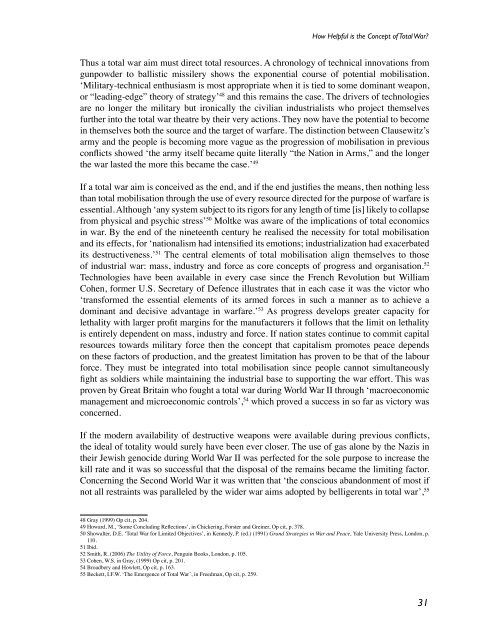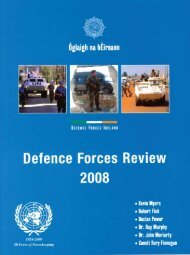Defence Forces Review 2010
Defence Forces Review 2010
Defence Forces Review 2010
Create successful ePaper yourself
Turn your PDF publications into a flip-book with our unique Google optimized e-Paper software.
How Helpful is the Concept of Total War?Thus a total war aim must direct total resources. A chronology of technical innovations fromgunpowder to ballistic missilery shows the exponential course of potential mobilisation.‘Military-technical enthusiasm is most appropriate when it is tied to some dominant weapon,or “leading-edge” theory of strategy’ 48 and this remains the case. The drivers of technologiesare no longer the military but ironically the civilian industrialists who project themselvesfurther into the total war theatre by their very actions. They now have the potential to becomein themselves both the source and the target of warfare. The distinction between Clausewitz’sarmy and the people is becoming more vague as the progression of mobilisation in previousconflicts showed ‘the army itself became quite literally “the Nation in Arms,” and the longerthe war lasted the more this became the case.’ 49If a total war aim is conceived as the end, and if the end justifies the means, then nothing lessthan total mobilisation through the use of every resource directed for the purpose of warfare isessential. Although ‘any system subject to its rigors for any length of time [is] likely to collapsefrom physical and psychic stress’ 50 Moltke was aware of the implications of total economicsin war. By the end of the nineteenth century he realised the necessity for total mobilisationand its effects, for ‘nationalism had intensified its emotions; industrialization had exacerbatedits destructiveness.’ 51 The central elements of total mobilisation align themselves to thoseof industrial war: mass, industry and force as core concepts of progress and organisation. 52Technologies have been available in every case since the French Revolution but WilliamCohen, former U.S. Secretary of <strong>Defence</strong> illustrates that in each case it was the victor who‘transformed the essential elements of its armed forces in such a manner as to achieve adominant and decisive advantage in warfare.’ 53 As progress develops greater capacity forlethality with larger profit margins for the manufacturers it follows that the limit on lethalityis entirely dependent on mass, industry and force. If nation states continue to commit capitalresources towards military force then the concept that capitalism promotes peace dependson these factors of production, and the greatest limitation has proven to be that of the labourforce. They must be integrated into total mobilisation since people cannot simultaneouslyfight as soldiers while maintaining the industrial base to supporting the war effort. This wasproven by Great Britain who fought a total war during World War II through ‘macroeconomicmanagement and microeconomic controls’, 54 which proved a success in so far as victory wasconcerned.If the modern availability of destructive weapons were available during previous conflicts,the ideal of totality would surely have been ever closer. The use of gas alone by the Nazis intheir Jewish genocide during World War II was perfected for the sole purpose to increase thekill rate and it was so successful that the disposal of the remains became the limiting factor.Concerning the Second World War it was written that ‘the conscious abandonment of most ifnot all restraints was paralleled by the wider war aims adopted by belligerents in total war’, 5548 Gray (1999) Op cit, p. 204.49 Howard, M., ‘Some Concluding Reflections’, in Chickering, Forster and Greiner, Op cit, p. 378.50 Showalter, D.E. ‘Total War for Limited Objectives’, in Kennedy, P. (ed.) (1991) Grand Strategies in War and Peace, Yale University Press, London, p.110.51 Ibid.52 Smith, R. (2006) The Utility of Force, Penguin Books, London, p. 105.53 Cohen, W.S. in Gray, (1999) Op cit, p. 201.54 Broadbery and Howlett, Op cit, p. 163.55 Beckett, I.F.W. ‘The Emergence of Total War’, in Freedman, Op cit, p. 259.31
















